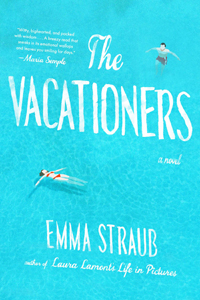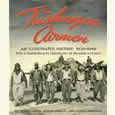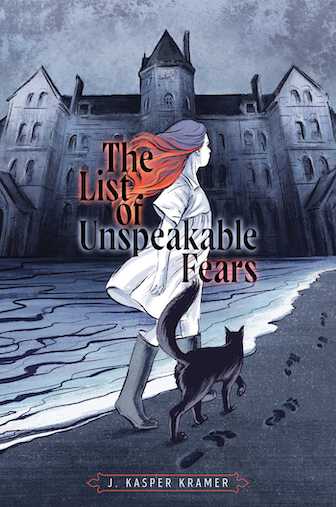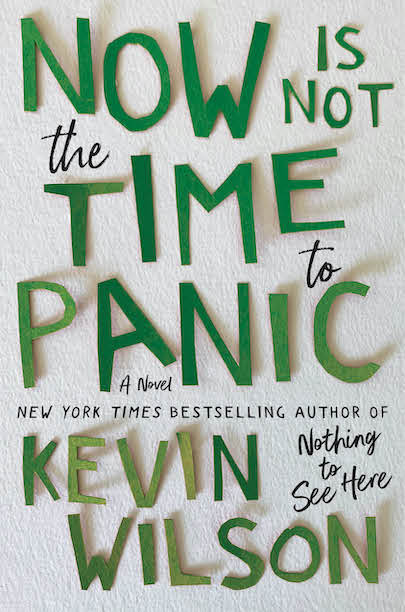Everyone Wanting Only the Best
In The Vacationers, Emma Straub’s characters head to Mallorca amid simmering conflict
“Families were nothing more than hope cast out in a wide net, everyone wanting only the best,” writes Emma Straub in her clever and poignant second novel, The Vacationers. In the case of Jim and Franny Post, an affluent Manhattan couple no longer middle-aged but not yet old, the best doesn’t seem like too much to ask as they prepare to embark on a two-week vacation, a final family trip before their youngest child, Sylvia, flies the nest for her freshman year at Brown. Then, just weeks before they leave for a pristine villa high in the hills of Mallorca, the Posts’ perfect life is imperiled by the revelation that Jim has had an affair with a very young subordinate at the magazine he edits, resulting both in his swift dismissal from his job and the previously unimaginable possibility that the Posts’ marriage might not survive the summer.
 “Leaving always came as a surprise, no matter how long the dates had been looming on the calendar,” Straub writes at the outset of The Vacationers. Jim Post is packing his suitcase, wondering how the date of departure has crept up on him so unexpectedly. “There were things that Jim would have taken out of his bags, if it had been possible: the last year of his life, and the five before that, when it came to his knees; the way Franny looked at him across the dinner table at night; the feeling of himself inside a new mouth for the first time in three decades, and how much he wanted to stay there; the emptiness waiting on the other side of the return flight, the blank days he would have to fill and fill and fill.” Though this novel comes adorned with the breezy trappings of a classic escapist summer read—sun-drenched beaches and mouth-watering meals—it is clear from the outset that The Vacationers will also consist of some serious emotional combustion, and that Jim and Franny will not return to Manhattan unchanged.
“Leaving always came as a surprise, no matter how long the dates had been looming on the calendar,” Straub writes at the outset of The Vacationers. Jim Post is packing his suitcase, wondering how the date of departure has crept up on him so unexpectedly. “There were things that Jim would have taken out of his bags, if it had been possible: the last year of his life, and the five before that, when it came to his knees; the way Franny looked at him across the dinner table at night; the feeling of himself inside a new mouth for the first time in three decades, and how much he wanted to stay there; the emptiness waiting on the other side of the return flight, the blank days he would have to fill and fill and fill.” Though this novel comes adorned with the breezy trappings of a classic escapist summer read—sun-drenched beaches and mouth-watering meals—it is clear from the outset that The Vacationers will also consist of some serious emotional combustion, and that Jim and Franny will not return to Manhattan unchanged.
Straub weaves a tight, cohesive web of complications over the course of the Posts’ fourteen days on the island of Mallorca. Jim’s catastrophic indiscretion is only one flash point: the others on this extended-family jaunt have simmering secrets, too. Daughter Sylvia wants nothing more than to reinvent herself, particularly after an embarrassing incident at a summer party. Older brother Bobby brings along his live-in girlfriend Carmen, a Cubana personal trainer whom Jim and Franny disdain. Franny’s best friend Charles worries about how to counsel her through this crisis while his own husband, Lawrence, silently wishes they were back in the States, where they are on the verge of adopting a child. Set all these dramas in an exotic resort famed for incomparable cuisine and breathtaking scenery, throw in a pair of handsome Spaniards for the Post girls to swoon over, and you’ve got the makings of a novel likely to be peeking out of more than a few monogrammed beach totes this summer.
 This is not to say that The Vacationers is a mere trifle. Straub’s prose is clean and lyrically elegant, full of vivid metaphors and clever wordplay. Laura Lamont’s Life in Pictures, Straub’s earlier novel, earned favorable comparisons to the likes of Lorrie Moore, with whom Straub studied at the University of Wisconsin. The Vacationers is a comedy of manners especially reminiscent of Diane Johnson’s Le Divorce, and seems equally likely to be made into a film. (Indeed, as I read, I began to visualize Meryl Streep as Franny and David Strathairn as Jim, with maybe soon-to-be Brown graduate Emma Watson and buffed-up hunk du jour Channing Tatum as the Post kids.) The story offers food and love; leisure and lust; confession and betrayal; more leisure, and more food. But there are also finely drawn characters and family conflicts that will feel familiar to almost any reader.
This is not to say that The Vacationers is a mere trifle. Straub’s prose is clean and lyrically elegant, full of vivid metaphors and clever wordplay. Laura Lamont’s Life in Pictures, Straub’s earlier novel, earned favorable comparisons to the likes of Lorrie Moore, with whom Straub studied at the University of Wisconsin. The Vacationers is a comedy of manners especially reminiscent of Diane Johnson’s Le Divorce, and seems equally likely to be made into a film. (Indeed, as I read, I began to visualize Meryl Streep as Franny and David Strathairn as Jim, with maybe soon-to-be Brown graduate Emma Watson and buffed-up hunk du jour Channing Tatum as the Post kids.) The story offers food and love; leisure and lust; confession and betrayal; more leisure, and more food. But there are also finely drawn characters and family conflicts that will feel familiar to almost any reader.
The mercurial Franny struggles to bring everyone together—Jim included—through food, though her husband’s betrayal has also exacerbated her own insecurities: “Franny knew plenty of women who had chosen to prioritize the eternal youth of their bodies, and they were all miserable creatures, their taut triceps unable to conceal their dissatisfaction with their empty stomachs and unfulfilling lives. Franny liked to eat, and to feed people,” Straub writes. For his part, Jim comes off as genuinely contrite and desperate to be forgiven, but he still thinks longingly about the young woman for whom he has effectively destroyed his career and possibly his marriage, in passages that are simultaneously pathetic and surprisingly tender.
The central theme, of course, is the complicated nature of the contemporary family, with its far-flung children, friends too close not to be thought of as family, and appendage members who may not be welcomed enthusiastically into the fold. How, Straub seems to ask, can a family stay together with so much else in the world competing for each member’s attention, and so many reasons to dislike each other? How do we maintain lasting bonds when so much must necessarily change about and between us?
There will undoubtedly be readers who feel hard-pressed to work up any sympathy for the problems of people who can afford to own homes on Central Park West, send their children to Brown, and fly seven people to Spain for two weeks. But even such skeptics cannot help but be charmed by Emma Straub’s endearing voice and her deftness in portraying the universal tensions amongst families, spouses, parents, and lovers. The Posts and friends can be a bit exasperating but mostly, I suspect, because we see more of ourselves in them than we might like to admit. Emma Straub draws them so delicately that, by the end of their journey, our time with The Vacationers feels surpassingly well spent.
Emma Straub will appear at Vanderbilt University on April 17, 2014, as part of the Gertrude and Harold Vanderbilt Visiting Writer Series. The reading will be held in Buttrick Hall Room 102 at 7 p.m.


